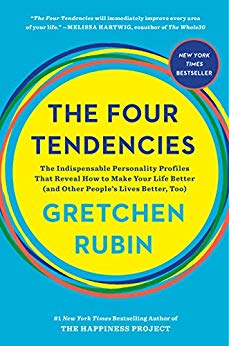

This article is an excerpt from the Shortform summary of "The Four Tendencies" by Gretchen Rubin. Shortform has the world's best summaries of books you should be reading.
Like this article? Sign up for a free trial here .
How do you respond to expectations? Do you fulfill them, or resist them?
Gretchen Rubin developed The Four Tendencies, a simple yet powerful personality test based on expectations. The Four Tendencies are the Upholders, Questioners, Obligers, and Rebels. Discovering which tendency you are can help you decide which career is right for you, how to better understand and interact with others, and to discover your personal strengths and weaknesses.
Continue below to learn more about the four tendencies.
How Rubin Created the Four Tendencies
Gretchen Rubin is a writer interested in human nature and patterns in human behavior, what actions we take and why we take them. Over lunch one day, a friend of hers was complaining that she wanted to keep up her running habit, but she was finding it difficult to maintain. She used to be on the track team in high school, and had no problem running then. But now, as an adult, she couldn’t make herself go running.
Why did this happen? This conversation stuck in Rubin’s head, and the more Rubin thought about it, the more she begin to suspect that a bunch of habits people do or don’t have — being able to run without a coach, or needing a trainer to get anything done at the gym; happily taking responsibility at work, or bucking under authority — came down to a simple “bedrock distinction” that set people apart.
From this conversation, Rubin eventually designed a simple personality test based on one question: how do you respond to expectations? From people’s answers to questions around this subject, she devised the Four Tendencies.
What Are the Four Tendencies?
The Four Tendencies describe four different personality types based on response to expectations, both internal (the expectations you have for yourself) and external (the expectations other people have for you).
Expectations are things we act on, or not. An example of an internal expectation would be, “I want to be a famous writer!” or “I need to clean my room.” External expectations would be more like, “My boss really needs this report by Friday,” or “My mother wants me to dress more modestly.”
So what are the Four Tendencies? There are 4 ways people meet expectations, and this determines their “tendency”: there are Upholders, Questioners, Obligers, and Rebels. The way each tendency generally responds to internal and external expectations is:
- Upholders meet all expectations, internal and external.
- Questioners meet internal expectations, but not external.
- Obligers meet external expectations, but not internal.
- Rebels resist all expectations.
Of course, how each tendency responds to expectations affects what each tendency needs to take action:
- Upholders value self-reliance and performance: tell them what needs to be done, and they’ll do it.
- Questioners value reason and purpose: if they feel what needs to be done is justified, they’ll do it.
- Obligers value teamwork and duty: hold them accountable for something, and they’ll do it.
- Rebels value freedom and choice: let them choose what they want to do, and they’ll do it.
Rubin also compares each of the four tendencies to a traffic light color:
- Red = Rebels: expectations bring them to a halt.
- Yellow = Questioners: they’ll proceed, but with caution.
- Green = Obligers: ask, and they’ll go, go, go.
- Blue = Upholders (for no stated reason other than there being no other colors in a traffic light)
From Rubin’s research, the US population roughly breaks down like so along the four tendencies:
- 41% of people are Obligers
- 24% are Questioners
- 19% are Upholders
- 17% are Rebels
There’ll be a quiz to determine your tendency at the end of this chapter, but you can start to think about what type you are with this example question: how do you feel about New Year’s resolutions?
- If you enjoy making resolutions all the time, including New Year’s, you might be an Upholder.
- If you make and keep resolutions but feel January 1 is an arbitrary date, you might be a Questioner.
- If you don’t make resolutions because you always give them up, you might be an Obliger.
- If you don’t make resolutions because you don’t believe in them, or if you only make them if there’s a challenge involved, you might be a Rebel.
What to Do With the Four Tendencies
Once you figure out which of the four tendencies you are, it’s tempting to compare to the other tendencies and try to figure out whether you’d be better off as another one.
Rest assured — there are no happier or more successful tendencies. Every tendency has strengths and weaknesses. The happiest people are the ones who know their tendency, embrace it, and work with it to achieve the best results. The most miserable people are the ones who can’t identify their own tendency, or think they can change their own or someone else’s.
Tendencies and Careers
Should which of the four tendencies you have determine your career? Not necessarily. Any tendency can thrive in most any career, if they recognize their strengths and weaknesses in that role and adapt accordingly. For instance, people might assume that Rebels would make the best artists — but an Upholder might actually perform better, fulfilling their own expectations with their art, but becoming successful because they can navigate other people’s expectations for them.
———End of Preview———

Like what you just read? Read the rest of the world's best summary of Gretchen Rubin's "The Four Tendencies" at Shortform . Learn the book's critical concepts in 20 minutes or less .
Here's what you'll find in our full Four Tendencies summary :
- What the Four Tendencies are, in complete detail
- How to compensate for your tendency's weakness
- Which tendency you pair best with romantically
- How to deal with other people's tendencies






